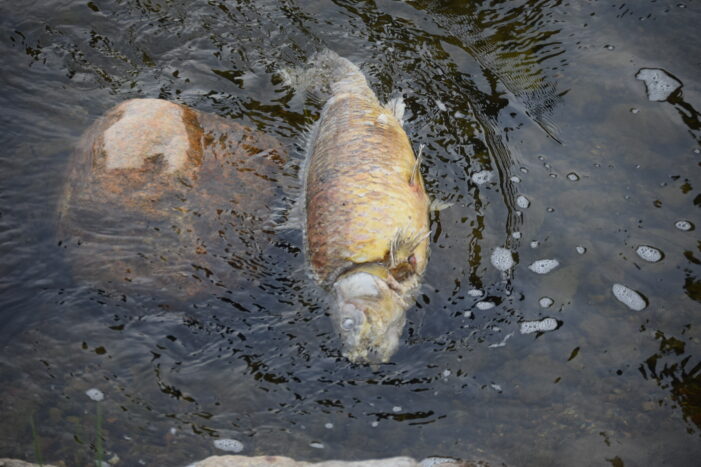By Jim Newell
Review Editor
Something’s rotten in Lake Orion. Literally hundreds of dead carp have washed up ashore, float in the shallows near residents’ homes and litter the lake.
And the smell of dead, rotting carp has left many on Lake Orion wondering what has caused the mass deaths and what can be done about the carcasses?
Between 250 and 500 of dead carp have been found in Lake Orion since July 19, says the Michigan’s Department of Natural Resources in an update on Friday, adding the dead carp were reported by residents using the DNR’s Eyes in the Field website.
Now, the DNR is investigating, sending biologists out to collect samples. The only species involved is adult common carp.
“Typically, when you see single-species mortality events, the cause is usually a specific fish pathogen and is often a virus,” said Gary Whelan, Fisheries Division Research Program manager. “Fish kills involving one type of fish are usually not associated with a water quality issue, as water quality issues affect the entire fish community. In this case, the affected fish are common carp which are very tolerant of poor water quality. Thus, it is even more unlikely to be a water quality issue.”
Fisheries Division staff from the Waterford office visited Lake Orion on July 23 and collected common carp samples for analysis. These samples will be analyzed by the Aquatic Animal Health Laboratory at Michigan State University.
The DNR expects some initial findings to be available during the week of Aug. 2, with a complete set of results by the first week of September. The DNR will make the final results known to the public when available.
Village of Lake Orion Public Works Director Wes Sanchez has been in contact with the DNR about the issue.
“I contacted the DNR on Monday (July 26) and he said they took samples of a few of the dead carp on Friday (July 23) and they got the samples to the lab on Monday. So, we should have results sometime this week. He suspects it’s some kind of virus that only affects carp. He said it happened at another lake up north,” Sanchez said.
Residents can throw the dead carp in their garbage, bury the fish on their property or take them to East Lawn Cemetery on Orion Road.
The village DPW dug a hole at the south end of the property on a portion of land that is not being used. Residents can bag up the dead carp and dispose of them in the hole, if they choose. The DPW will then bury the rotten fish.
“I’ll make it apparent that this is where you can throw your dead fish,” Sanchez said. “We take the fish off village property – the beaches, the creek – but we are not collecting people’s dead fish.”
Check the village website, lakeorion.org, for updates.
The DNR reminds the public that viruses and bacteria that affect fish are not typically human pathogens due to the differences in body temperatures between fish and humans. It is strongly recommended that all freshwater fish be fully cooked to ensure they are safe to consume, the DNR stated.
For more information on choosing and eating safe fish, visit Michigan.gov/EatSafeFish.
Common carp, native to Europe, were introduced to Michigan in the late 1870s-1880s as a food fish and were widespread in Michigan by the 1890s.


Leave a Reply